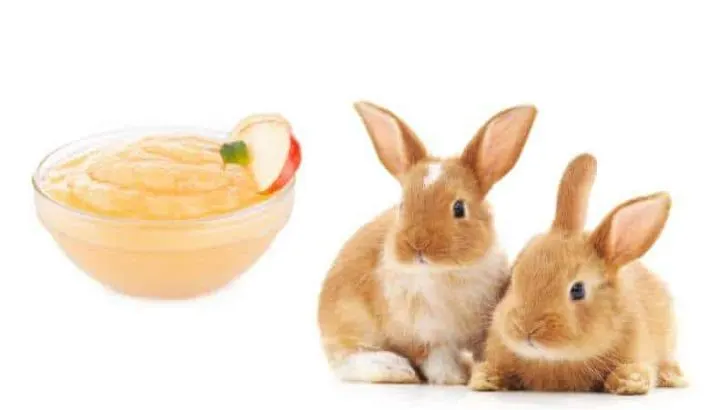Opposing to general opinion, rabbits need to eat more than just carrots and lettuce. Of course, they eat apples as well, but what about apples in other forms? Maybe you asked yourself the question: Can rabbits eat applesauce?
The answer is simple:
Yes, but only a tiny amount. In general, processed foods with added sugars, such as applesauce, aren’t good for your bunny. On top of that, it can cause several health issues.
So, there are potential health hazards to feeding your bunny applesauce?
Yes, there’s a lot to be said here. Without further ado, let’s talk about applesauce’s nutritional value, as well as the potential risks of applesauce consumption in rabbits.
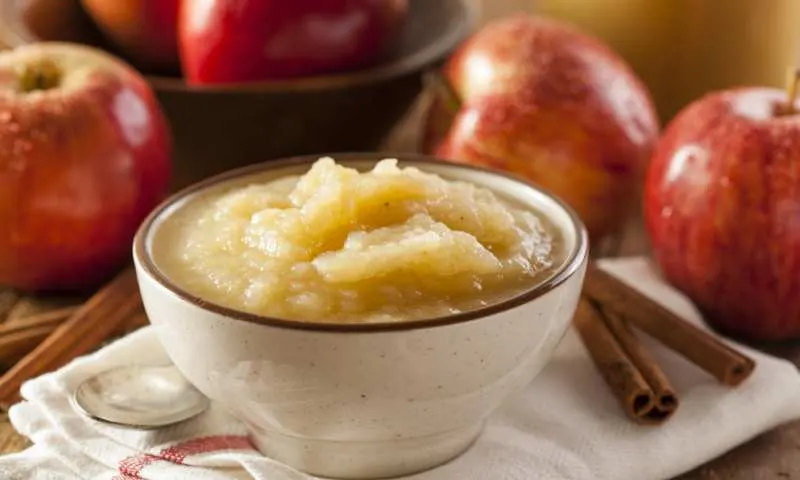
Rabbits Diet 101
Rabbits are herbivores – meaning they eat plants only – that feed by grazing. So, in essence, they’re constantly snacking on something.
That doesn’t mean rabbits don’t have specific dietary needs. If you introduce them to new foods too quickly or feed them something inappropriate, the rabbit’s digestive flora could be disturbed.
Rabbits require a balanced diet of hay, pellets, fresh vegetables, and fruit. Let’s take a look at each of these individually:
- Hay – The bottom of a rabbit food pyramid would contain long-stemmed forage, such as hay. In fact, it should make up to 90 percent of a rabbit’s diet. So, make sure you provide it daily. Excellent choices of hay are Timothy, orchardgrass, brome, and oat hay.
- Pellets -Timothy hay pellets are suitable for bunnies in small quantities. Make sure palettes are high in fiber; the higher, the better. Adult rabbits will need one-quarter cup of pellets daily.
- Vegetables – Two cups of fresh vegetables should be more than enough to satisfy a rabbit’s needs. A variety of two to three vegetables is ideal. Good examples are bell peppers, romaine lettuce, cucumber, bok choy, and zucchini.
- Fruits – Fruit should be given no more than once or twice a week, as they serve as a treat. Some options to consider feeding your rabbit include apples, bananas, berries, oranges, and melons.
Finally, rabbits need to stay hydrated, so it’s essential to provide them with an unlimited supply of freshwater. The water should be changed daily.
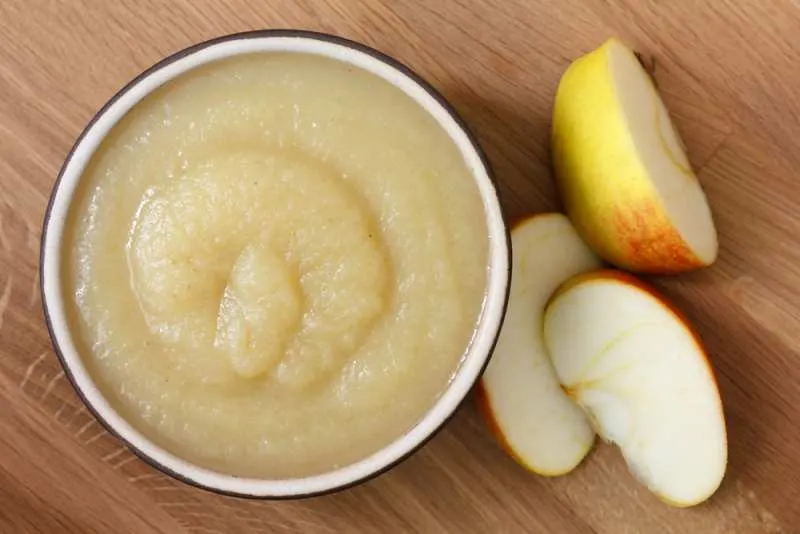
Applesauce – Nutritional Value
Applesauce is a semi-solid food made from apples, a liquid – such as water, apple juice, cider – spices, and added sugar. The mixture is cooked until the apples soften enough to be mashed; the recipe is that simple!
With that being said, we will look at what applesauce provides in terms of nutrition.
Nutrition Facts
| Portion Size | 100 grams |
| Calories | 76 grams |
| Fat | 0,2 grams |
| Sodium | 28 milligrams |
| Carbohydrates | 20 grams |
| Dietary Fiber | 1,2 grams |
| Protein | 0,2 grams |
| Vitamin D | 0,00 micrograms |
| Calcium | 4,00 milligrams |
| Iron | 0,35 milligrams |
| Potassium | 61 milligrams |
As we can see, applesauce lacks fiber, a nutrient responsible for the normal functioning of the digestive system. On top of that, carbohydrate levels are way too high, which in itself is a significant reason why rabbits shouldn’t eat applesauce.
I will talk more about the dangers of sugar later on, though.
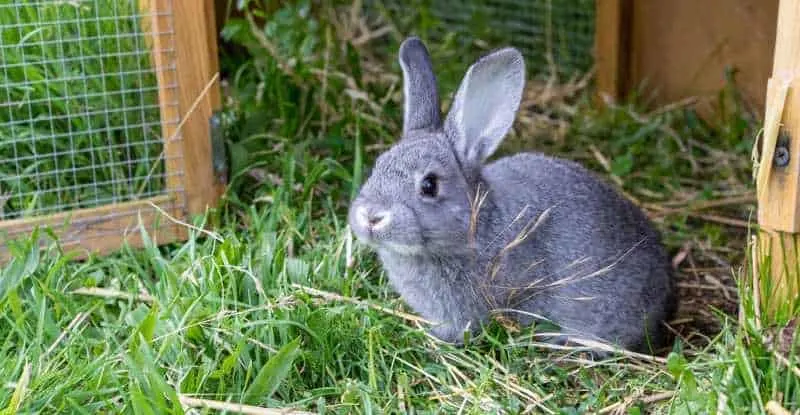
Can Rabbits Eat Applesauce?
Rabbits shouldn’t eat applesauce because it contains too much sugar for their tiny bodies. Moreover, spices and flavorings found in the applesauce are bound to invoke some health problems.
While rabbits can – and should – eat fruit like apples, it needs to be given in moderation.
As stated above, a rabbit’s diet should be oriented more towards other types of foods. Treats such as fruit should make up between 5 to 10 percent of a rabbit’s diet.
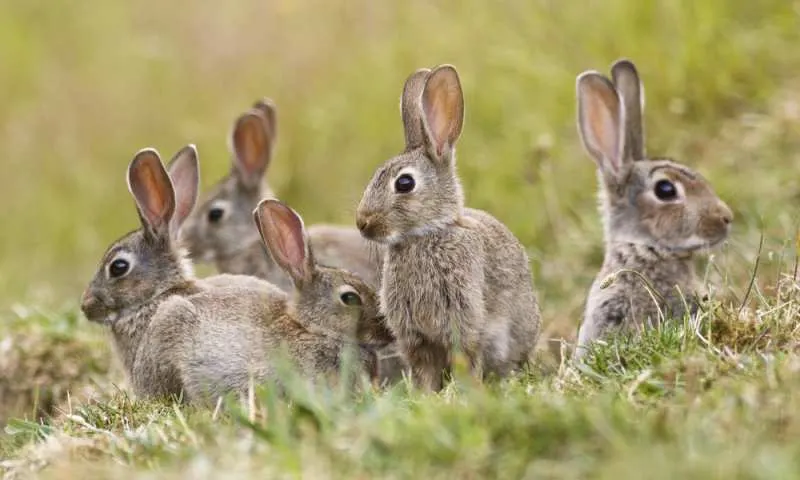
Risks Of Applesauce In Rabbits Diet
Rabbits have extremely sensitive stomachs and are prone to digestive problems if not fed properly.
As I mentioned above, apples are an acceptable treat for rabbits when it’s limited to once or twice a week. Applesauce, on the other hand, is a different story:
While apples are mashed, sugar is added to sweeten the mixture and bring out the flavor of the fruit. Even though sugar helps the applesauce taste better, it also increases the risks of several health issues.
If you feed your rabbits too much applesauce, it may lead to some of the following health problems.
Obesity
Your bunny would need to take in more calories than it’s exerting to gain weight. So, overeating is typically the reason for obesity in rabbits.
That’s why active rabbits are less likely to be affected by this factor.
Sugary treats, such as applesauce, are contributors to obesity in rabbits. Even though chubby rabbits are considered cute, that doesn’t mean they are healthy.
Rabbits that are prone to obesity tend to be more than 20 to 40 percent overweight. An easy way to determine if your bunny is overweight is to search for its ribs. If you can’t find them, the chances are your rabbit is obese.
Other signs of obesity may include breathing difficulties and constant tiredness.
Diarrhea
Rabbits that eat too many foods high in carbohydrates, such as applesauce, are more prone to developing gastrointestinal problems. Diarrhea is one of them, and if not treated properly and in time, it can often be life-threatening.
Symptoms of this condition are:
- Loss of appetite
- Weight loss
- A dirty bottom
- Low energy
- Bloating
- Stomach pain
Constipation
The usual sign that your rabbit is constipated is if it stops defecating completely or is doing so less than normal. Look closely at any changes in your rabbit’s feces, as constipation can be total or partial.
Either way, seeking professional help is advised.
Gastrointestinal Stasis
In addition, eating too many carbohydrates can lead to gastrointestinal stasis.
You see, excessive amounts of carbohydrates can change the pH levels of the gastrointestinal tract. Furthermore, a high-carbohydrate diet favors the gas-producing bacteria found in rabbit stomachs.
Symptoms of this condition are:
- Lethargy
- Dehydration
- Decreased appetite.
This condition is known to be deadly if not treated.
Heart Problems
Heart disease can be challenging to diagnose as rabbits naturally have a high heart rate.
Varying between 140 and 180 beats per minute is relatively high. The stress caused by visiting the vet can result in over 300 beats per minute. That makes it almost impossible for a vet to detect irregular rhythms without proper equipment.
If left untreated, heart disease can lead to heart failure, which is almost always fatal.
Symptoms of heart disease include weakness, reduced appetite, tiredness, and increased breathing rate.
It’s important to remember that these signs may indicate a number of other underlying issues. So make sure you visit your local vet and get a diagnosis as soon as possible.
Dental Problems
You guessed it; sugar is to blame yet again as it impacts rabbit’s teeth as well.
As a rabbit owner, make sure to check their mouth as well as their general health. Dental problems may result in:
- Weight loss
- A bumpy jawline
- A runny nose
- Less active
- Reduced appetite
In addition, have your rabbit’s teeth checked at least once a year by your local vet. They will be able to examine your rabbit’s back teeth.
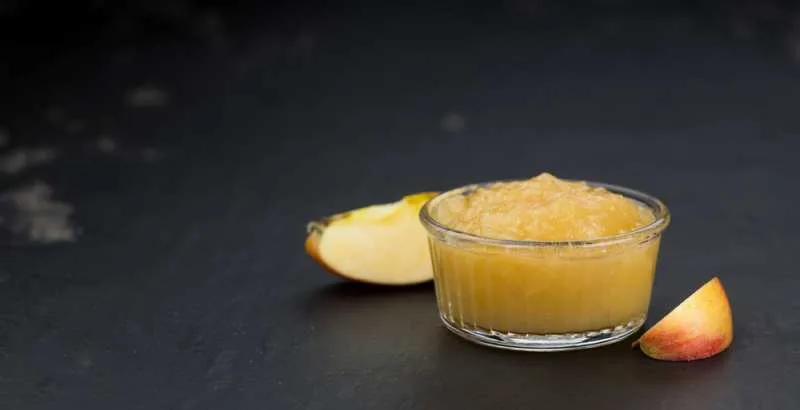
Safe Types Of Applesauce
An occasional tablespoon of applesauce shouldn’t pose a significant risk for your bunny. With that said, you should still keep your rabbit’s applesauce consumption as low as possible.
There are several types of applesauce, including cinnamon, strawberry, mango, and peach. The problem is these varieties are full of additives and flavorings that may be dangerous to your bunny.
If you want to feed your rabbit applesauce, make sure you buy plain organic, no-sugar-added applesauce.
That doesn’t mean they should eat it in unlimited quantities; there is still sugar in it.
Alternatively, you can give your rabbit a slice of apple instead of applesauce. Plain apples contain much less sugar compared to applesauce. Additionally, it will provide a delicious treat for your bunny.
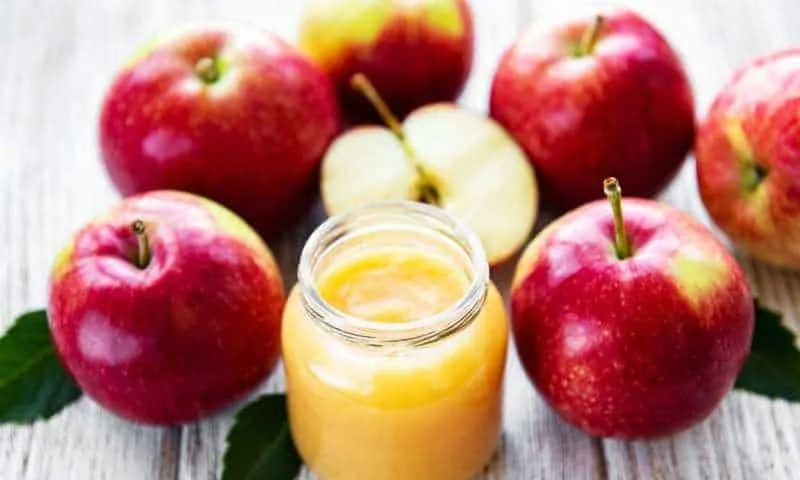
Conclusion
In the end, the correct answer to the question “Can rabbits eat applesauce?” is:
Yes, but they really shouldn’t. Rabbits need more grains and vegetables than fruits and other treats, which should be fed in moderation due to high amounts of sugar.
If the applesauce is all-natural without added sugar and other additives, then it’s fine to feed some to your bunny.
But overall, your rabbits have enough sugar from other fruits, vegetables, and pallets. Increasing sugar in their diet can lead to some serious health-related problems.
Due to their sensitive digestive system, problems such as constipation and diarrhea oppose a potentially fatal risk. Others include heart and dental issues.
The healthier alternatives you can give to your rabbit are cucumbers, peppers, or fruits like bananas or ordinary apples.
Remember to provide your rabbit with a variety of food choices necessary for their development and healthy lifestyle. In addition, you should always seek out help from your local vet if you have any concerns regarding your rabbit’s health or diet.

